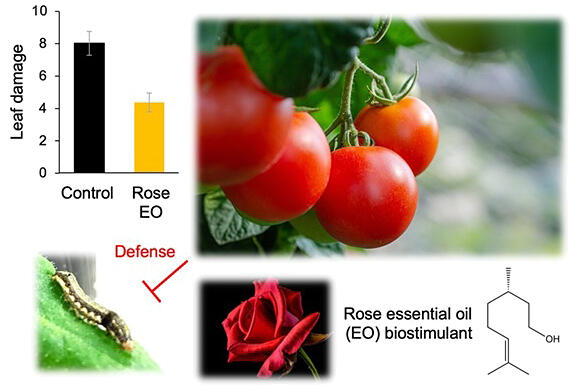A research group led by Professor Gen-ichiro Arimura of the Department of Biological Science and Technology, Faculty of Advanced Engineering at Tokyo University of Science has announced that they discovered that treatment with rose essential oil increased the expression of the defense gene PR1 in tomato leaves, and enhanced potential disease resistance. Rose essential oil was also found to attract predators of pests. These results are expected to contribute to the development of plant immunity activators and were published in the March 18 issue of Journal of Agricultural and Food Chemistry.

Provided by Tokyo University of Science
Essential oils are used in a myriad of fields, including in cosmetics and the food industry. In this study, the research group used diluted solutions of 11 different plant essential oils and added them to potted tomato soil to determine their effectiveness. Results showed that the rose essential oil solution significantly increased the PR1 transcription level in leaves 24 hours after its application to tomato soil. Moreover, experiments conducted at various concentrations showed that only the 1 × 105-fold diluted rose essential oil solution promoted expression of PR1.
Tomato plants treated with the rose essential oil solution had reduced leaf-feeding damage from the larvae of the pest Spodoptera litura and fewer eggs laid by adult females of Tetranychus urticae compared to plants treated with the control solvent. No PR1 activation was observed when the rose essential oil solution was sprayed directly on the leaves. Furthermore, compositional analysis of rose essential oil was conducted to identify which components were responsible for the effects.
Rose essential oil was found to contain unique terpenoids such as β-citronellol and geraniol. To test their effects, 6.27 µM β-citronellol and 2.46 µM geraniol, corresponding to the concentrations of respective compounds in the diluted rose essential oil solution, were added to tomato-plant soil. A significant increase in the PR1 transcription level in leaves was observed one day after addition of β-citronellol, indicating that β-citronellol enhances plant defense. Furthermore, efficacy of the rose essential oil solution on tomato plants was evaluated in field trials.
The addition of the rose essential oil solution to tomato plant soil every three days has been proven to decrease damage caused by naturally occurring insect pests to 54.5% compared to the control solution. They also demonstrated that volatile organic compounds released from the rose essential oil solution attracted Phytoseiulus persimilis, a predator of T. urticae. The rose essential oil described in this study can be used at low concentrations and differs from ordinary pesticides as it enhances the potential defense mechanisms of plants. Thus, it is expected to be used as a new environmentally friendly material.
Arimura said, "Essential oils are used as fragrances for various purposes but have never been used for the protection of plants against pests. The development of new pest control technologies to replace pesticides is essential for sustainability, safety, and security in food production and for environmental conservation. We would like to advance research into implementation of rose essential oil for these purposes."
Journal Information
Publication: Journal of Agricultural and Food Chemistry
Title: Novel Potential of Rose Essential Oil as a Powerful Plant Defense Potentiator
DOI: 10.1021/acs.jafc.3c08905
This article has been translated by JST with permission from The Science News Ltd. (https://sci-news.co.jp/). Unauthorized reproduction of the article and photographs is prohibited.




